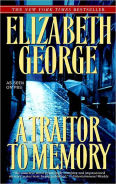I’ve been rereading this series of mysteries featuring Detective Inspector Thomas Lynley of Scotland Yard. It’s been over ten years since I’ve read any of them, so there are new additions to the series, and even back then I don’t think I’d read all of them. I do remember being astounded when I read her first book, A Great Deliverance. What a story! So many layers. And an unusually textured theme. I couldn’t think about anything else until I finished it.
The series only gets better from there. In this, the 11th book, Lynley is asked by his superior, Superintendent Webberly, to help investigate the hit and run death of Eugenie Davies. Webberly takes a personal interest because his first murder investigation as a DI was the death of Eugenie’s baby.
Interspersed with the investigation are journal entries by Eugenie’s estranged son. Gideon is a child prodigy, now a twenty-eight-year-old virtuoso who suddenly and mysteriously at the start of a long-anticipated concert at Wigmore Hall, lost the ability to play the violin. Along with it, he seems to have lost great chunks of his memory, so the psychiatrist he’s started seeing encourages him to write down what he does remember.
Among the many things George excels at is choosing titles. I am still thinking about this one. Gideon argues about the effect of his loss with his new American friend. Privately tutored as a child, until he met Libby he had no friends beyond his father and his music teacher. She keeps trying to persuade him that he is still a person even if he’s not able to play the violin. Gideon, though, whose life has been devoted to the instrument, thinks otherwise. In his journal, he asks, “How do I exist when the sum and substance of who I am and who I have been for the last twenty-five years is contained in and defined by my music?”
Interestingly, this idea calls up themes from the last book, though George doesn’t actually point that out. In that book, Lynley’s former Detective Sergeant, now demoted to Detective Constable, Barbara Havers, asks herself who she would be without her identity as a detective. This is another thing George excels at: she introduces backstory from earlier books in the series only rarely and only when it is necessary to the current story. Havers’s identity questions are left unspoken here, but add an extra dimension for a reader who recalls them.
Aside from basing identity on our vocation, there remains the consideration of memory. Does Gideon’s memory loss contribute to his feeling that he has ceased to exist? Who are we if we don’t have our memories? And since we rework our memories over the years, who are we if what we remember turns out not to be true? This last question actually get carried forward into the next book in the series.
This question of what constitutes our identity is a tangled one, fascinating in its permutations as it is carried out in various lives. It is especially interesting in the context of murder mysteries, where there are many secrets and where detectives must ferret out the hidden sides of the various characters, which in turns reveal previously unexpected aspects of their own. Everyone is changed. The end of each story leaves everyone—murderer, detectives, suspects, families and friends—in a new place.
Have you read any of Elizabeth George’s novels? Which is your favorite?

